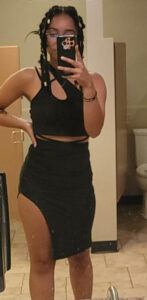“To me, locs are a symbol of strength and beauty, almost like a lion’s mane,” Zendaya says in Insider magazine.
As part of the African culture, dating back centuries, protective hairstyles emerged within the Black community to maintain the health of their natural hair and echoed strength and creativity in African tribes.
There are a lot of protective hairstyle options for Black women that can be used with one’s natural hair or with added synthetic hair. Marketing junior Analee Harris has worn passion twists and other kinds of twists before. She has found that these hairstyles keep her hair “locked in” for as long as she needs it to, which ends up being around two weeks. According to Harris, the protective style and how long it lasts can depend on what type of hair is being fed into it.
Many Black women who have type 4c hair, which is the most coily hair type someone can have, wear box braids because the braids tend to last a lot longer than other protective styles. Harris’ hair type isn’t as coily, but she still finds it difficult to manage, which is why she wears protective hairstyles.
“[4c hair] can be very difficult to manage, and I know even just because it’s hard to manage my hair, and I don’t have anything near 4c hair,” Harris said. “I have cousins, grandparents, aunts and uncles that all have that hair type, and they pretty much stay within the protective hairstyle realm just because it makes it easier.”
Harris explained that wigs can be categorized as a protective style because they cover a person’s whole head of hair. Additionally, many Black men and women wear bonnets and scarves because they “protect the look of the hair when you go to sleep.”
Protective hairstyles are also worn “for fun.” Harris mentions a friend she has that found a style that “works for her,” and she wears it all the time. Harris hasn’t seen this friend’s natural hair in three years.
Straight hair strands are much thicker compared to Afro-textured, type-4 hair strands. Type-4 hair strands are fragile, prone to breakage and are slow to produce natural oils.
“Straight hair produces way more natural oils, which is why, typically, people with that hair have to wash it out every day. Because when that happens, it gets very greasy, it weighs it down way too much, and it just doesn’t look healthy,” Harris said. “But we probably produce that much [oil] over the course of maybe a couple of weeks, so it doesn’t weigh our hair down. That’s why we buy extra oils to put in our hair to give it some of those extra nutrients for growth and just overall health.”
Harris mentioned a current online controversy. The rosemary hair oil manufactured by Mielle Organics, a Black-owned hair brand, blew up on TikTok when a white influencer swore that it worked wonders on her hair. Now, the product is selling out and prices are rising.
Fear and speculation that the brand will change their formula to be inclusive for all hair types is emerging, since it has “happened to multiple different haircare products for Black women” before.
“Part of the frustration is that just from history. Black women never had anything for themselves, like ever,” Harris said. “Making the oil more inclusive is problematic because when you make those products more inclusive to fit every hairstyle, it doesn’t fit [Black women’s] hairstyles anymore.”
It’s no question why some people will turn their heads when they see a non-Black person wearing a protective hairstyle. This is often seen as cultural appropriation, which is defined as a priviledged person or group’s unacknowledged or inappropriate adoption of a subculture’s or minority community’s cultural identity markers.
Harris believes that if wearing protective hairstyles or using hair oils isn’t beneficial to other hairtypes, then it doesn’t make sense for them to be using the resources that Black people rely on. Wearing protective hairstyles and using additional oils can be damaging for hair types that don’t require it.

“I’ve met some people that don’t understand, which is okay,” Harris said. “If they’re trying to learn, I have no problem, but it’s when they’re blatantly saying that Black women are gatekeeping, or that we’re too sensitive, or that it’s about sharing culture — no. There are certain things that should be separated in every culture.”
A study by Dove reports that “Black women are one-and-a-half times more likely to be sent home, or know of a Black woman sent home, from the workplace because of their hair.” The same study shows that 80% of Black women are likely to change their natural hair to meet societal expectations in the workplace.
“Protective hairstyles, curly hairs, just natural hair in general, can be seen, and has been seen, as very unprofessional for some reason. It’s just, you know, from history trying to whitewash a lot of things and thinking that everything needs to be clean, and it needs to be sleek, and stuff like that to be professional,” Harris said.
Harris herself has had comments made about her hair for being “too big” because it prevented a classmate behind her from seeing the board. She explained that her sister has also experienced instances like this at school.
Harris referred to a California law called the Create a Respectful and Open World for Natural Hair Act, which her mom, a hairstylist, told her about. The CROWN act was established in 2019, and, according to the Legal Defense Fund, a legal organization that fights for racial justice, discrimination against race-based hair, texture and protective styles is prohibited in the workplace and schools.
